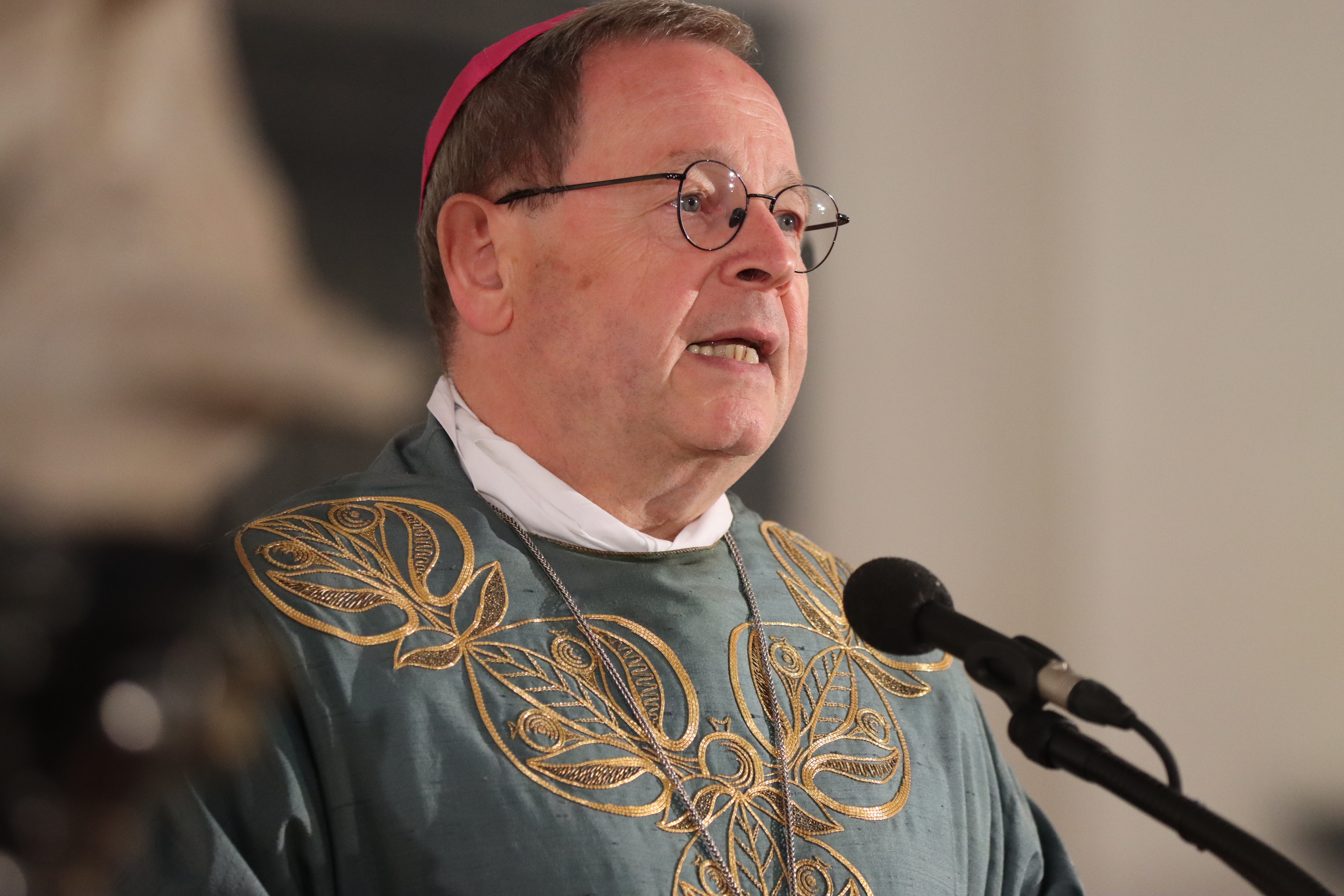Fulda – A debate between global challenges, synodality, and the search for unity. The autumn plenary assembly of the German Bishops’ Conference began today in Fulda and will run until September 25. Of the 61 members in total, 58 participated in the sessions, under the leadership of President Georg Bätzing, gathered at the Maritim Hotel am Schlossgarten.
At the heart of the program is the exploration of the sixth Church Membership Study, with a reflection on pastoral and theological perspectives for the future of the Catholic Church in Germany. Yet pressing issues are also on the table: the handling of sexual abuse, the historical memory of National Socialism, the role of the Church during the pandemic, geopolitical challenges, and the matter of military and civilian service.
The opening with the Apostolic Nuncio
The assembly opened with the Apostolic Nuncio to Germany, Archbishop Nikola Eterović, who delivered a speech centered on the theme of unity. Quoting the Gospel of John – “I am the vine, you are the branches” – he reminded the bishops that the Church, without Christ, cannot bear fruit. He recalled Pope Leo XIV’s motto In Illo uno unum, stressing how the Pontiff has placed the pursuit of unity at the center of his ministry. Eterović emphasized the need for a missionary commitment not limited to the internal life of the Church but capable of generating communion also through ecumenical and interreligious dialogue: “Unity does not come from human projects, but is a gift of the Holy Spirit.” He invited the bishops to be visible principles of unity, pointing to examples such as St. Irenaeus, proclaimed doctor unitatis.

The opening homily
During the Eucharistic celebration, President Bätzing offered a reflection inspired by the Book of Ezra. He recalled how God knows how to use unexpected paths, even instruments outside the believing community, to guide and renew his people. He urged the assembly to look beyond nostalgia or rigidity, warning against “neo-integralist attempts” that reject dialogue with secular society. On the contrary, he encouraged the search for “cooperations of hope” in order to confront global challenges together: war, migration, climate emergency, and artificial intelligence. Once again, therefore, Bätzing did not refrain from using the liturgy to promote his own personal ideas.
The press conference with Bätzing
Speaking to journalists, the President of the Conference did not avoid the most delicate issues. He clarified that Pope Leo XIV is not a copy of Francis but continues his fundamental line, particularly regarding synodality. He stressed that the new Pontiff has neither withdrawn nor modified the declaration Fiducia supplicans: “An important signal for us. Our guideline on the blessing of couples, Blessing strengthens love, remains valid, the result of transparent work with the Dicastery for the Doctrine of the Faith.” Yet the prelate pretends not to understand that one thing is Fiducia supplicans, and another is what they intend to do with it. Indeed, when questioned by journalists, he acted as if he did not grasp the point. Reporters repeatedly referred to Leo’s words on this document of the Dicastery for the Doctrine of the Faith. The Bishop of Limburg claimed that their guideline had been written with the Dicastery. From Rome, however, this circumstance is denied.
Considerable attention was also given to international politics. On Ukraine, Bätzing was clear: “The only way forward is for the aggressor to lay down arms. Any other option would lead to a false peace, not an authentic one.” He then addressed the tragic conflict in the Middle East, unequivocally condemning Hamas terrorism while also criticizing “the inhumane approach” of the Israeli government in Gaza: “Tens of thousands of innocent people have lost their lives. The solution remains a Palestinian state alongside Israel.” At the same time, he denounced the rise of antisemitism in Germany: “Jews are our fellow citizens and have the right to build their future here.”
On the domestic front, Bätzing touched on political and social issues. He warned against the dangers of the AfD party, calling its nationalism incompatible with the Christian vision, and reaffirmed the role of the Churches in fostering social cohesion. He also addressed the country’s demographic and economic difficulties, urging a serious debate on future generations and on military and civilian service.
The issue of sexual abuse was not ignored: the president recalled that 77% of requests had been examined and €76 million in compensation paid, while acknowledging that “the times remain painful for many victims.”
A look to the future
The assembly’s program also foresees a study day on the mission of the Church in secular society and the evaluation of the work of the Synodal Committee, tasked with drafting a statute for a future National Synodal Council. Thus, the day concluded with the Nuncio’s call to unity and the analyses – at times controversial – of the President of the German Bishops’ Conference. A contrast of tones that reflects well the tensions within the Church in Germany: caught between impulses and ideologies and calls to fidelity, between a restless desire for reform and the binding demand for communion with Rome.
p.F.A.
Silere non possum